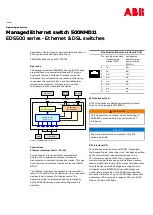
2
•
Before cleaning the switch, remove all power cords from the switch. Do not clean the switch
with a wet cloth or liquid.
•
Do not place the switch near water or in a damp environment. Prevent water or moisture from
entering the switch chassis.
•
Do not place the switch on an unstable case or desk. The switch might be severely damaged in
case of a fall.
•
Ensure good ventilation of the equipment room and keep the air inlet and outlet vents of the
switch free of obstruction.
•
Connect the yellow-green protection grounding cable before power-on.
•
Make sure the operating voltage is in the required range.
•
To avoid electrical shocks, do not open the chassis while the switch is operating or when the
switch is just powered off.
•
When replacing field replacable units (FRUs), including interface cards, power supplies, and
fan trays, wear an ESD wrist strap to avoid damaging the units.
Examining the installation site
The switch must be used indoors. You can mount your switch in a rack or on a workbench, but make
sure:
•
Adequate clearance is reserved at the air inlet and outlet vents for ventilation.
•
The rack or workbench has a good ventilation system.
•
Identify the hot aisle and cold aisle at the installation site, and make sure ambient air flows into
the switch from the cold aisle and exhausts to the hot aisle.
•
Identify the airflow designs of neighboring devices, and prevent hot air flowing out of the
neighboring device from entering the device.
•
The rack is sturdy enough to support the switch and its accessories.
•
The rack or workbench is reliably grounded.
To ensure correct operation and long service life of your switch, install it in an environment that meets
the requirements described in the following subsections.
Temperature/humidity
Maintain temperature and humidity in the equipment room as described in "
views and technical specifications
."
•
Lasting high relative humidity can cause poor insulation, electricity leakage, mechanical
property change of materials, and metal corrosion.
•
Lasting low relative humidity can cause washer contraction and ESD and cause problems
including loose mounting screws and circuit failure.
•
High temperature can accelerate the aging of insulation materials and significantly lower the
reliability and lifespan of the switch.
For the temperature and humidity requirements of different switch models, see "
Cleanliness
Dust buildup on the chassis might result in electrostatic adsorption, which causes poor contact of
metal components and contact points, especially when indoor relative humidity is low. In the worst
case, electrostatic adsorption can cause communication failure.








































